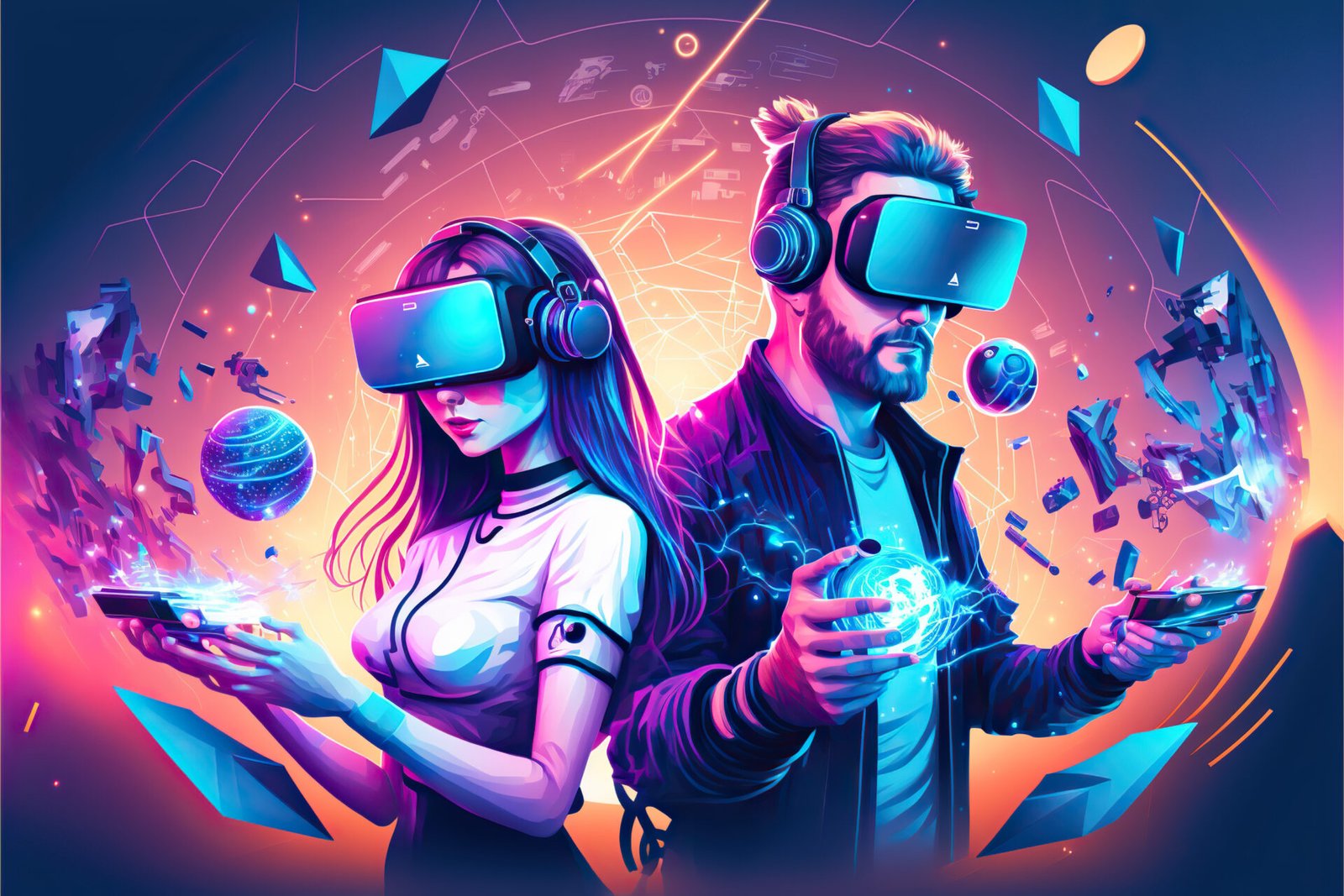The virtual reality startup that Facebook has acquired is known for its cutting-edge technology and innovative approach to creating immersive virtual experiences. With this acquisition, Facebook aims to leverage the startup’s expertise and resources to accelerate the development of its metaverse vision.
The metaverse, a term coined by science fiction writer Neal Stephenson in his novel Snow Crash, refers to a virtual universe where people can interact with each other and digital objects in real-time. It is a fully immersive and interconnected digital world that transcends the limitations of traditional online platforms.
Facebook’s interest in the metaverse is not surprising, considering its long-standing commitment to pushing the boundaries of technology and connecting people across the globe. The company has already made significant investments in virtual reality through its subsidiary Oculus, which has released several VR headsets and software platforms.
However, the acquisition of this virtual reality startup signals Facebook’s intent to go beyond hardware and software development and dive deeper into the creation of a metaverse ecosystem. By bringing in the expertise and talent of the startup’s team, Facebook aims to accelerate the development of immersive experiences that seamlessly integrate with its existing social media platforms.
One of the key areas where the metaverse has the potential to revolutionize is social interaction. In the metaverse, users will be able to interact with each other in a more natural and immersive way, breaking down the barriers of physical distance and creating a sense of presence. Imagine attending a virtual concert where you can see and interact with your friends in real-time, or exploring a virtual shopping mall where you can try on clothes and get personalized recommendations from virtual assistants.
Gaming is another industry that stands to benefit greatly from the metaverse. With the ability to create fully immersive and interactive virtual worlds, game developers can push the boundaries of storytelling, gameplay, and player engagement. Imagine stepping into a virtual fantasy world where you can embark on epic quests with thousands of other players, or competing in virtual sports tournaments where your physical skills are translated into digital prowess.
Online commerce is yet another area that could be transformed by the metaverse. With virtual storefronts, consumers can browse and purchase products in a more immersive and personalized way. Virtual reality can provide a more realistic and detailed representation of products, allowing consumers to make more informed purchasing decisions. Additionally, virtual marketplaces can facilitate peer-to-peer transactions, enabling users to buy and sell virtual assets and services within the metaverse.
While the concept of the metaverse is still in its infancy, Facebook’s acquisition of this virtual reality startup is a clear indication of the company’s commitment to making it a reality. By combining its vast user base, technological expertise, and now the resources of the startup, Facebook is positioning itself as a leader in the race to build the metaverse.
As technology continues to advance at an exponential rate, the concept of the metaverse is becoming more tangible and realistic. The metaverse is not just a virtual reality space, but rather a fully immersive and interactive digital world that transcends the boundaries of traditional online experiences. It is a place where users can not only explore and interact with computer-generated environments, but also connect and engage with other users in real-time.
Imagine a world where you can step into a virtual reality headset and instantly find yourself in a bustling marketplace, surrounded by avatars of other users from around the world. You can browse through virtual shops, try on virtual clothes, and even purchase virtual goods with digital currency. The metaverse is a place where you can attend virtual concerts, participate in virtual sports events, and explore virtual landscapes that are limited only by the imagination of its creators.
But the metaverse is not just about entertainment and escapism. It has the potential to revolutionize the way we work, learn, and collaborate. In the metaverse, you can attend virtual meetings and conferences, collaborate on projects with colleagues from different parts of the world, and even receive virtual training and education. The possibilities are endless, and the metaverse is poised to reshape the way we interact with technology and each other.
However, the metaverse is not without its challenges. One of the biggest challenges is creating a seamless and intuitive user experience that allows users to navigate and interact with the metaverse effortlessly. This requires not only advanced technology, but also thoughtful design and user interface considerations. Another challenge is ensuring the privacy and security of users within the metaverse, as the vast amount of personal data and information that is exchanged in this digital world can be vulnerable to cyber attacks and misuse.
Despite these challenges, the metaverse holds immense potential for innovation and advancement. It has the power to bring people together, bridge geographical distances, and create new opportunities for creativity, collaboration, and exploration. The metaverse is no longer just a concept or a distant vision of the future, but a rapidly evolving reality that is shaping the way we live, work, and play.
Facebook’s Metaverse Ambitions
Facebook’s acquisition of a virtual reality startup is a clear indication of the company’s ambitions to play a leading role in the development of the metaverse. By leveraging virtual reality technology, Facebook aims to create a platform that goes beyond traditional social media interactions and offers users a more engaging and immersive digital environment.
With the metaverse, Facebook envisions a future where people can connect, communicate, and collaborate in ways that were previously unimaginable. It has the potential to revolutionize not only social media but also various industries such as gaming, entertainment, education, and even online commerce.
Imagine a world where you can attend a virtual concert and feel like you are standing in the front row, surrounded by thousands of other fans. Or envision a classroom where students from different parts of the world can come together in a shared virtual space, interacting with each other and their instructors as if they were in the same room.
The metaverse holds the promise of breaking down geographical barriers and creating a truly global community. It has the potential to redefine how we work, play, learn, and socialize. Facebook’s acquisition of the virtual reality startup is a strategic move to position itself at the forefront of this transformative technology.
By investing in virtual reality and related technologies, Facebook is not only expanding its reach but also diversifying its revenue streams. The metaverse offers new opportunities for monetization, such as virtual goods, in-app purchases, and advertising within the virtual environment.
However, the development of the metaverse also raises important questions about privacy, security, and ethical considerations. As people spend more time in virtual environments, there is a need to ensure that their personal data is protected and that they have control over their virtual identities.
Additionally, the metaverse must be inclusive and accessible to all. It should not become a digital divide where only those with access to the latest technology can fully participate. Facebook, as a leading player in the metaverse space, has a responsibility to address these challenges and work towards creating an open and equitable digital future.
In conclusion, Facebook’s acquisition of a virtual reality startup is a significant step towards realizing its metaverse ambitions. The metaverse has the potential to revolutionize various industries and create new opportunities for connection and engagement. However, it also comes with challenges that need to be addressed to ensure a safe, inclusive, and ethical digital environment.
The Impact on Social Interaction
The metaverse has the potential to reshape the way we interact with others online. Instead of simply scrolling through news feeds and leaving comments, users will be able to enter virtual spaces and engage with others in a more lifelike manner. This could include attending virtual events, exploring virtual worlds, and interacting with avatars that represent real people.
By creating a more immersive and interactive social experience, the metaverse could foster deeper connections and meaningful interactions. It could bridge the gap between physical and digital interactions, allowing people to connect and collaborate regardless of their geographical location.
Imagine attending a virtual concert in the metaverse. Instead of watching a live stream on a screen, you could enter a virtual venue, surrounded by other avatars who share the same interest in the artist. You could chat with fellow attendees, dance together, and even interact with the virtual representation of the artist. The experience would be more than just passive consumption; it would be an active and participatory social event.
In addition to virtual events, the metaverse could also provide opportunities for exploration and adventure. Users could enter virtual worlds where they can interact with each other and the environment. They could go on virtual hikes, solve puzzles together, or even build virtual structures collaboratively. The possibilities for social interaction within the metaverse are vast and diverse.
Furthermore, the metaverse could also have a positive impact on social inclusivity. In the physical world, there are often barriers to social interaction, such as physical disabilities or geographical distance. However, in the metaverse, these barriers can be diminished or even eliminated. Avatars can provide a level playing field, where everyone can participate and engage in social activities without being limited by their physical circumstances.
However, it is important to consider the potential drawbacks of the metaverse on social interaction. While it has the potential to enhance connections and create new opportunities, it could also lead to a further divide between the physical and digital worlds. Some individuals may become so engrossed in the metaverse that they neglect real-life relationships and interactions. It is crucial to strike a balance between the virtual and physical worlds, ensuring that the metaverse complements and enhances our existing social interactions rather than replacing them entirely.
With the metaverse, the future of gaming looks incredibly promising. The integration of virtual reality technology has already revolutionized the gaming industry, but the metaverse takes it to a whole new level. Imagine stepping into a virtual world where you can physically move, interact with objects, and communicate with other players in real-time. This level of immersion creates an unparalleled gaming experience that transcends traditional gaming boundaries.
In this metaverse, multiplayer experiences will reach unprecedented heights. Gone are the days of playing against faceless opponents; now, you can team up with friends and explore vast virtual worlds together. Whether it’s embarking on epic quests, solving intricate puzzles, or engaging in intense battles, the metaverse allows for seamless collaboration and interaction. The shared experience becomes more than just a game; it becomes a journey that you and your friends embark on together.
Furthermore, the metaverse empowers game developers to push the boundaries of creativity and innovation. With the ability to create complex and dynamic game worlds that seamlessly blend reality and virtuality, developers can craft experiences that are truly mind-boggling. Picture a game world that adapts to your actions, where your decisions have real consequences, and where the virtual characters behave and respond as if they were real. The metaverse opens up a whole new realm of possibilities for game developers to explore, creating games that are not only visually stunning but also intellectually stimulating.
But the future of gaming doesn’t stop there. The metaverse has the potential to bridge the gap between gaming and other industries. Imagine attending virtual concerts, where you can interact with the artist and other fans, or exploring virtual museums, where you can learn about history and art in a whole new way. The metaverse has the power to transform entertainment, education, and even social interactions, blurring the lines between the virtual and the real world.
Of course, the development and widespread adoption of the metaverse will not happen overnight. There are still challenges to overcome, such as technological limitations, privacy concerns, and ensuring equitable access for all. However, the potential benefits and possibilities that the metaverse brings to the gaming industry are undeniable. It is an exciting time for gamers and game developers alike, as we embark on a new era of gaming that promises to revolutionize the way we play and experience games. The future of gaming is here, and it’s waiting for us in the metaverse.
Transforming online commerce in the metaverse has the potential to revolutionize the way we shop and interact with products. Imagine stepping into a virtual storefront where you can explore a vast array of products in a visually stunning and interactive environment.
As you enter the metaverse, you find yourself surrounded by virtual stores that offer a wide range of products. Each store is meticulously designed to create a unique shopping experience, with attention to detail that rivals the physical world. You can browse through the virtual aisles, picking up items, examining them closely, and even trying them out virtually.
For example, if you are looking to buy a new pair of shoes, you can enter a virtual shoe store where you can see the shoes displayed on virtual shelves. You can pick them up, rotate them, and inspect them from every angle to get a better sense of their design and quality. If you want to try them on, you can simply select your size and see how they look on a virtual representation of yourself.
But the metaverse doesn’t stop at just visual exploration. It also incorporates haptic feedback technology, allowing you to feel the texture and weight of the products. When you pick up a virtual item, you can feel its weight in your virtual hand, and when you touch it, you can feel its texture through haptic gloves or suits.
Furthermore, the metaverse enables social interactions while shopping. You can invite your friends to join you in the virtual store, and together you can browse and discuss different products. You can even ask for their opinions on how a particular item looks on you, just like you would in a physical store.
Once you have made your selection, you can proceed to the virtual checkout counter, where you can complete your purchase using virtual currency or link your real-world payment methods. The purchased items can then be delivered to your physical address or, in some cases, directly to your virtual avatar.
By leveraging the power of the metaverse, businesses can create a more immersive and personalized shopping experience for their customers. They can showcase their products in ways that were previously impossible, allowing customers to engage with them on a deeper level. This not only enhances the overall shopping experience but also provides businesses with valuable insights into customer preferences and behavior.
Overall, the metaverse has the potential to transform online commerce by offering a truly immersive and interactive shopping experience. It opens up new possibilities for businesses and customers alike, bridging the gap between the physical and digital worlds and revolutionizing the way we shop.
































